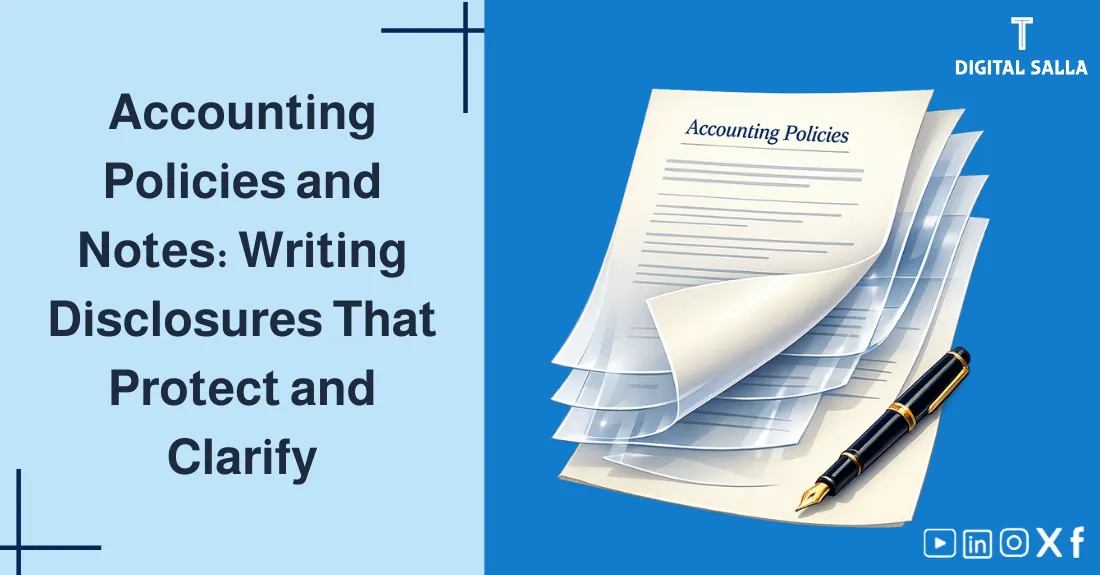Accounting Policies and Notes: How to Write Disclosures that Protect the Company and Clarify the Picture?

Accounting Policies and Notes: How to Write Strong Financial Disclosures?
Many focus on the numbers and forget that Notes to Financial Statements are what “explain the numbers” and transform statements from silent tables into an understandable story. In this guide, you will learn the difference between Accounting Policies and Financial Disclosures, and how to build organized Notes to Financial Statements that protect the company and facilitate the work of the reader and auditor.

- Clear understanding of Notes to Financial Statements and what they must include.
- A practical structure for writing the notes memorandum without generic “copy and paste”.
- How to link every material number in the statements to a clear note number (Cross-referencing).
- A list of common mistakes that cause audit observations even if the numbers are correct.
1) What are Notes to Financial Statements?
Notes to Financial Statements are the section that explains the details of the statements and how the presented numbers were reached. They are not an “optional appendix”; rather, they are part of the statements themselves. Imagine seeing a line item like “Inventory = 12,500” — the number alone does not answer questions like: How was inventory valued? Are there damaged goods? Is there stock held by third parties? Here comes the value of Financial Disclosures.
2) Who reads disclosures and why?
If you write notes with the logic of “Auditor only”, they lose value. If you write them with the logic of “Non-specialist reader only”, they may lose accuracy. It is best to address multiple readers at the same time.
| The Reader | What matters to them in the Notes? | Example of a practical question |
|---|---|---|
| Investors/Owners | Risks, obligations, quality of earnings, judgments, and estimates. | Is profit backed by cash flows? Are there hidden liabilities? |
| Banks/Lenders | Covenants and guarantees, debt maturities, liquidity, influential policies. | Are there Covenants? What are the loan terms? |
| The Auditor | Compliance with standards, consistency, completeness, and linking statements to notes. | Do disclosures reflect reality or generic texts? |
| Management | Explaining performance indicators and causes of material changes. | Why did inventory rise? Why did the revenue recognition policy change? |
3) Accounting Policies vs Notes: Practical Difference That Saves Time
The word “Policies” is sometimes used as a synonym for Notes, but practically there is an important difference: Accounting Policies explain the “logic of measurement and recognition,” while Notes explain “details and supporting explanation for numbers.” Policies are often written as a section within the Notes memorandum.
| Element | Accounting Policies | Notes |
|---|---|---|
| Goal | Explain “How” recognition, measurement, and presentation were done. | Explain “What the number consists of” + details + risks/obligations. |
| Content Form | Clear and specific texts for a specific company. | Text + Tables (movements/aging/classifications) + Cross-references. |
| Examples | Inventory valuation, Revenue recognition, Depreciation. | Inventory details, Asset movement, Liability maturities, Related parties. |
4) Golden Rules for Writing Strong Disclosures
To make Financial Disclosures truly useful, focus on 6 practical rules:
4.1 Materiality Above All
Do not drown the reader with dozens of pages about immaterial items, and do not neglect a material disclosure because it is “complex”. Always start with the question: What might affect the decision of the statement user?
4.2 Write for the Reader: Clear Language + Precise Terminology
Clear text does not mean superficial text. Use a quick definition when needed, and standardize terms within the report. If your team struggles with terminology differences, a unified terminology reference helps a lot.
4.3 Consistency of Policies Across Periods + Disclosure Upon Change
Change may be legitimate, but the problem lies in non-disclosure or failure to explain the impact. Any change in a key policy deserves: Reason for change + Impact + Comparability.
FS Draft Workbook - Excel File
4.4 Link Every Material Number to a Note Number (Cross-referencing)
The reader does not want to search. Place the note number next to the item inside the statements, and inside the note place a reference to the statement and item. In this way, statement details become traceable at first glance.
4.5 Avoid “Ready-made” Texts Unrelated to Reality
The biggest cause of weak Notes is copying generic texts that do not reflect the company’s activity, risks, or contracts. The auditor often picks this up quickly and requests redrafting.
4.6 Don’t Write Alone: Review with Operations/Tax/Legal
Many disclosures (obligations, covenants, lawsuits, contracts) do not come from accounting alone. Set a clear information gathering path from relevant departments before closing.
5) Practical Structure for Notes (Notes Template)
This is a practical structure often used in preparing Notes to Financial Statements, and can be adapted according to the company’s size and nature. The Key: Logical order + same sequence of items appearing in the statements.
| Section | What does it include? | Quick Quality Indicator |
|---|---|---|
| A) General Information | Company activity, legal structure, currency, period, and reference for statement preparation. | Can the reader understand the company’s activity in 30 seconds? |
| B) Basis of Preparation + Accounting Policies | Standards framework (IFRS/…), accrual basis, key policies (revenue, inventory, assets, loans…). | Is the policy “specific to your company” or generic text? |
| C) Material Judgments and Estimates | Areas of judgment: receivable aging, asset impairment, provisions, assumptions… | Did you mention what might change results if the assumption changes? |
| D) Item Notes per Statements | Every material item in statements with: details + tables + movement + comparison + note number. | Can the reader trace the number from statement to note and vice versa? |
| E) Special Disclosures | Related parties, covenants and obligations, subsequent events, risk management, segments… as needed. | Has information been gathered from relevant departments and reviewed? |
6) Linking Statements to Notes (Cross-referencing) — SVG Diagram
The goal of linking isn’t “report beautification”, but reducing time wasted searching, and reducing inconsistency errors between statements and note text. The following diagram illustrates the reader’s journey from the number to details and back to the statement.
7) Practical Examples of Note Tables
The best note is one that balances “short text” and “clear table”. Here are common examples you can adapt for your company.
7.1 Example: Fixed Assets Movement (Property, Plant, and Equipment)
| Item | Beginning Cost | Additions | Disposals | Ending Cost |
|---|---|---|---|---|
| Equipment | 120,000 | 35,000 | (5,000) | 150,000 |
| Furniture | 40,000 | 8,000 | — | 48,000 |
| Item | Beg. Accumulated Dep. | Period Depreciation | Disposals | End. Accumulated Dep. |
|---|---|---|---|---|
| Equipment | 45,000 | 12,000 | (2,000) | 55,000 |
| Furniture | 16,000 | 4,500 | — | 20,500 |
7.2 Example: Accounts Receivable Aging (Briefly)
| Category | Balance | Disclosure Note |
|---|---|---|
| Current (0–30 days) | 1,250,000 | Relatively low risk |
| Overdue (31–90 days) | 310,000 | Subject to collection follow-up |
| Overdue (> 90 days) | 95,000 | Provision made per company policy |
7.3 Example: Lease Contract Disclosures
Lease contracts are among the items requiring organized financial disclosures (especially when applying requirements like IFRS 16). If you have more than one contract, you will usually need tables and consolidated aggregations instead of writing scattered texts.
8) Common Mistakes in Notes That Make the Auditor “Stop”
These are errors that occur frequently, affecting report quality and trust—even if the numbers are correct:
- Conflict between Statements and Notes: Different number or classification without explanation.
- Generic uncustomized policies: Text from another company that does not reflect your activity.
- Absence of Comparisons: Numbers without prior period comparison, or comparison without explaining material changes.
- Failure to mention Material Judgments: Key estimates without explaining inputs/sensitivity.
- Illogical Numbering: Notes not ordered with the sequence of statements, making tracing difficult.
- Overwhelming the Reader: Long pages about immaterial items vs two lines about material items.
9) Checklist Before Approval + Ready Tools
Before issuing statements, schedule a final review session for notes just like the numbers review. Here is a practical checklist (short but effective):
- Does every material item in the statements have a clear note number?
- Does note numbering follow the order of items appearing in the statements?
- Are accounting policies “customized” and explain what the company actually applies?
- Are there comparative figures for the previous period + explanation for material changes?
- Have disclosures for obligations/covenants/lawsuits been gathered from relevant departments?
- Has a final review and Sign-off been conducted before approval?
10) Frequently Asked Questions (FAQ)
Are Notes to Financial Statements part of the statements or a separate appendix?
They are part of the financial statements. Their goal is to interpret numbers, policies, estimates, and supporting details, so they are not treated as a secondary file.
What is the appropriate number of pages for Notes?
There is no fixed number. The standard is Materiality: sufficient disclosures to clarify material items without drowning the reader in immaterial details.
Can I copy ready-made accounting policies and then modify them?
You can as a start, but they must be customized to reflect the company’s reality (contracts, measurement methods, exceptions). Generic text without customization often causes audit observations.
What is the most important thing an auditor looks for inside the Notes?
Consistency between statements and notes, completeness of material disclosures, clarity of policies, and explanation of significant judgments and estimates.
How do I make Notes “readable” for non-accountants?
Use clear headings, short sentences, concise tables, and quick definitions of terms when needed, while maintaining standard accuracy.
11) Conclusion
Writing Notes to Financial Statements is not a formality: it shows the company’s commitment, interprets numbers, and reduces risks. Start with a clear structure, customize policies to express the company’s reality, link statements to notes, then execute a final review with a checklist.

